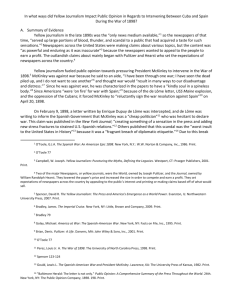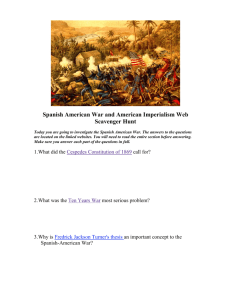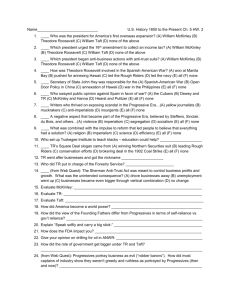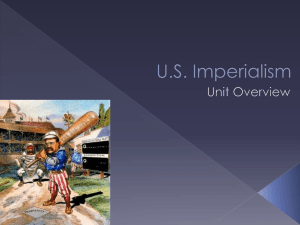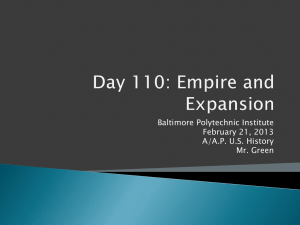Yellow Journalism and the Spanish-American War
advertisement
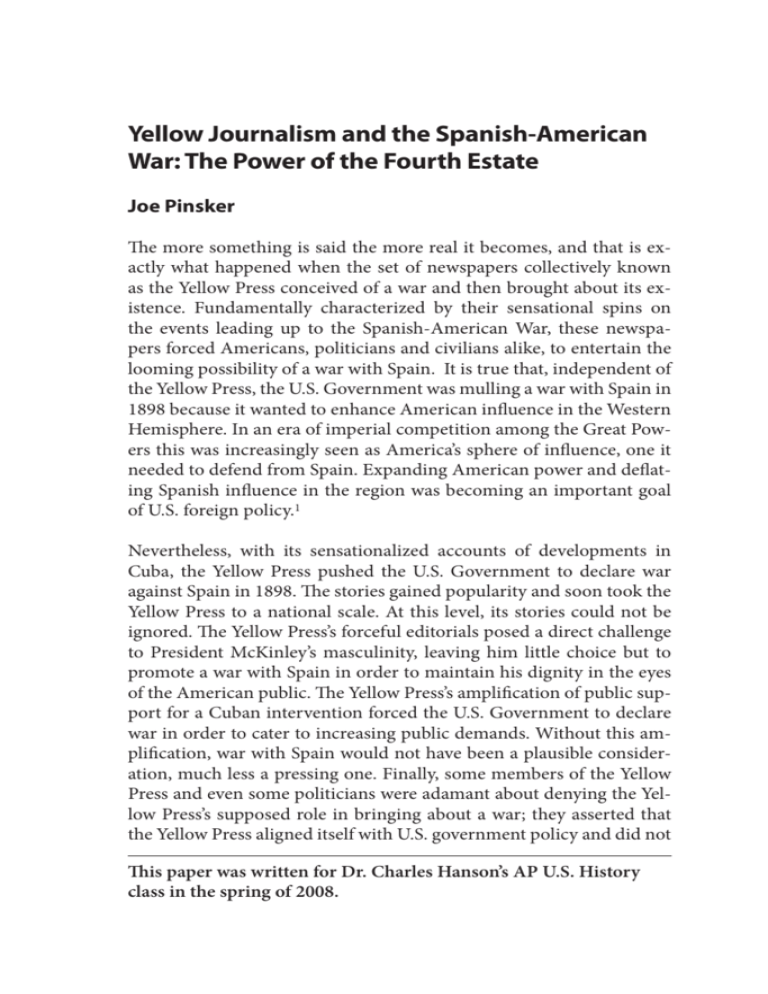
Yellow Journalism and the Spanish-American War: The Power of the Fourth Estate Joe Pinsker The more something is said the more real it becomes, and that is exactly what happened when the set of newspapers collectively known as the Yellow Press conceived of a war and then brought about its existence. Fundamentally characterized by their sensational spins on the events leading up to the Spanish-American War, these newspapers forced Americans, politicians and civilians alike, to entertain the looming possibility of a war with Spain. It is true that, independent of the Yellow Press, the U.S. Government was mulling a war with Spain in 1898 because it wanted to enhance American influence in the Western Hemisphere. In an era of imperial competition among the Great Powers this was increasingly seen as America’s sphere of influence, one it needed to defend from Spain. Expanding American power and deflating Spanish influence in the region was becoming an important goal of U.S. foreign policy.1 Nevertheless, with its sensationalized accounts of developments in Cuba, the Yellow Press pushed the U.S. Government to declare war against Spain in 1898. The stories gained popularity and soon took the Yellow Press to a national scale. At this level, its stories could not be ignored. The Yellow Press’s forceful editorials posed a direct challenge to President McKinley’s masculinity, leaving him little choice but to promote a war with Spain in order to maintain his dignity in the eyes of the American public. The Yellow Press’s amplification of public support for a Cuban intervention forced the U.S. Government to declare war in order to cater to increasing public demands. Without this amplification, war with Spain would not have been a plausible consideration, much less a pressing one. Finally, some members of the Yellow Press and even some politicians were adamant about denying the Yellow Press’s supposed role in bringing about a war; they asserted that the Yellow Press aligned itself with U.S. government policy and did not This paper was written for Dr. Charles Hanson’s AP U.S. History class in the spring of 2008. 40 Joe Pinsker dictate it. However, the very fact that these groups issued public denials of such allegations suggests that they felt the need to forestall any suspicion that they sought an active role in U.S. foreign affairs. A Matter of Masculinity: Pushing McKinley to Prove Himself When Cuban revolutionaries intercepted a letter from Spanish diplomat Dupuy de Lôme bashing President McKinley, the New York Journal broke the story. In this letter, which de Lôme intended to be private, the diplomat dismissed the President as a lame duck. The Journal would call the letter the “worst insult to the United States in its history.”2 The de Lôme letter incident and the explosion of the U.S.S. Maine in the harbor of Havana are usually seen as the primary proximate causes of the Spanish-American War. Because of the Yellow Press’s biased reporting, both these events precipitated a public outcry for war and brought McKinley’s dignity into question as well. For men in 1898, personal dignity was tied closely to the protection of one’s masculinity, so Americans evaluated their president based on his ability to defend himself from charges of impotence.3 Both these events served to place McKinley in an awkward dilemma: he could either defend his reputation and embark on a war that would signify the abandonment of his previous hopes of compromise, or he could continue pursuing peaceful terms with Spain, thus risking his own dignity in the eyes of the American public. McKinley had been planning to pursue a peaceful resolution since before his presidency.4 Therefore, to McKinley, going to war would be a personal loss and would represent reneging on his previous goals. As the Yellow Press brought the de Lôme letter to the public’s attention, it focused mainly on the letter’s attack on the president instead of on the content of the letter itself.5 Moreover, de Lôme’s charges seemed magnified because Spanish men were at the time stereotyped as epicene.6 Newspapers insisted that the President could not afford to tolerate being called weak and opportunistic.7 They did so in a way that left McKinley no room to say otherwise, which further exacerbated his already embarrassing situation. Therefore, newspapers practicing Yellow Journalism were deliberately attempting to persuade the public that McKinley was sure to opt for war and that anything less than THE MENLO ROUNDTABLE 41 violent revenge would be shameful for America as a whole. However, newspapers were equally conscious that McKinley himself had to be convinced. If McKinley dared not to respond violently toward Spain after articles like this hit the presses, he would most likely become, in the public eye, exactly the weak and effeminate politician de Lôme made him out to be. Without the Yellow Press’s direct explanations of the letter’s implications, McKinley might have been able to avoid a war and still escape with much of his dignity intact. In the end, the Press left him no such opportunity. The second, better-known event leading up to the Spanish-American War was the explosion of the U.S.S. Maine in Havana Harbor. The Yellow Press successfully convinced many Americans that the Spanish were to blame for the explosion, which meant that Spain had openly attacked seamen representing the United States. This sharpened McKinley’s dilemma because to the American public, the Spanish had not just assaulted McKinley’s cachet as they did in the de Lôme letter, but this time had physically attacked Americans. The Press made it clear that Spain now posed a physical threat to Americans. Some political cartoons published by the Yellow Press soon after the explosion promoted a sense of obligation to the fallen sailors, and that this obligation would not soon pass.8 Other cartoons flagrantly assaulted McKinley for not having a “backbone”; in one such cartoon, a noble Uncle Sam literally provides McKinley with a backbone in the form of a rifle.9 This let McKinley as well as the American public know that the only way for McKinley to avoid being ridiculed as weak and frail was to do the masculine thing by striking back against Spain. If McKinley was not going to stand up to Spain for the loss of American lives, many believed, he could not be trusted to stand up to Spain for anything. To Americans, father figures were supposed to protect their country, not let it be attacked without consequence. In the days immediately following the explosion, in order to combat the Yellow Press’s assertions that McKinley had yet to confirm his masculinity, his supporters tried to associate masculinity with patience and rationality so as to give the president more time to make a decision.10 This public-relations gambit suggests that McKinley and his followers felt threatened by the notion 42 Joe Pinsker that the public could view him as a less than adequate Commander in Chief. The widespread belief in McKinley’s lack of backbone was capitalized on by the Yellow Press and led McKinley to assert himself by pushing for a declaration of war on Spain. With its direct rhetoric and accusatory imagery, the Yellow Press successfully pushed McKinley into a war not of his choosing. Public Opinion Amplified: The Press Expands on Public Opinion In the early 1890s, Cubans reignited their long-simmering revolt against what they considered oppressive Spanish rule. Around the same time, the U.S. was preparing to make itself a world power by increasing its influence in the Western Hemisphere. With Americans taking a renewed interest in what was happening in their own hemisphere as a result of this shift in foreign policy, many became aware fairly quickly of the situation in Cuba. Americans had long taken a fairly keen interest in Cuban affairs, occasioned at first by both ideological affinity and sheer geographical proximity. Many Americans saw parallels between the plight of the Cuban rebels and the plight of America’s own patriots more than a century earlier. In the 1890s they began to make specific connections between the events of the Cuban uprising and those of the American Revolution. Soon Americans’ sympathy for the Cubans was visibly on the rise.11 Still, in the first three months after his inauguration in March of 1897, McKinley recorded in his notebook only two references to Cuba in the news and three letters dealing with the Cuban situation.12 At the time, his policies were focused more on domestic issues such as unemployment that he saw as more pressing than Cuba. He was free to pursue these domestic concerns because the American public was in no way pushing him toward any sort of intervention to save Cubans from Spanish brutality.13 As a result of the Yellow Press’s sensationalized reporting, however, the tide of public sentiment for war suddenly swelled in early 1898 when the de Lôme letter surfaced and the Maine exploded. After an investigatory trip to Cuba, Senator Redfield Proctor of Vermont assured the Senate that the Cubans suffered under conditions fully as THE MENLO ROUNDTABLE 43 dire as the Yellow Press charged. However, the Press was the medium through which Proctor’s message reached the public, and as usual it distorted his claims: one illustration that claimed to show what the senator saw in Cuba contained images of disturbingly emaciated men.14 Most Americans did not receive their news directly from transcripts from the Senate, of course, but rather from newspapers that claimed to relay events from Capitol Hill. Their reactions to these sensationalized images, themselves conceived mostly by men who never had left New York, fueled the public outcry for a resolution of the situation in Cuba. It was these amplified reactions—derived directly from the Yellow Press’s exploitation of the underlying American sympathy for the Cuban cause—that led McKinley to believe the nation was clamoring for war. McKinley’s secretary, George B. Courtelyou, affirmed that the majority of the letters to the president were in praise of his patience and rationality in postponing a decision to go to war.15 To Courtelyou, newspapers only projected the radical opinions of “ranters in Congress, the blatherskites who do the talking upon the street-corners and at public meetings, and the scavengers of the sensational press,” all of whom incorrectly represented the public’s opinion.16 In short, the Yellow Press expanded on existing public opinion. Though McKinley’s intense critics were few in number, the “vile slanders uttered against him” nonetheless deeply affected McKinley; according to Courtelyou, McKinley was soon under great strain.17 This strain was a result of the Yellow Press’s projections of slanderous and forceful critiques of the president, but those critiques were fundamentally derived from the American public’s original sympathy for the Cubans subjected to Spanish injustice. Had the Yellow Press not amplified public outcry for violent intervention, McKinley would not have felt nearly as pressured to go to war. Protesting Too Much: The Press Denies Any Involvement For the most part, private institutions prefer not to be seen as meddling too much in political affairs. Though some may indeed wield influence in the political realm, they will make efforts to deny this involvement; proof of such involvement could lead the public to fear and boycott the institution. Such was the case with Yellow Journalism and U.S. foreign 44 Joe Pinsker policy in this case. Facing accusations from respectable newspapers and most likely a fair amount of criticism from rational Americans, the Yellow Press took steps to ensure that it was not viewed as having masterminded the war with Spain in 1898. The apparent urgency of the need to deny those claims suggests the extent of the Yellow Press’s actual involvement. During the summer of 1897, before the Yellow Press had forced the government into war, resentment of the Yellow Press seemed to be stirring among the more respectable papers. Out of their bitterness toward losing sales to the crowd-pleasing New York World and New York Journal, respectable newspapers such as the New York Times began to condemn the Yellow Press for their deceitful ways. In June of 1897, most likely out of such bad feelings, the Times printed a speech made by one Andrew L. Gard at his high school graduation ceremonies entitled “Signs of Promise in the Crusade Against Yellow Journalism.” In his speech, Gard condemned the Yellow Press for committing the “crime” of going past the border between truth and sensationalism and also stressed the benefits of speaking out against Yellow Journalism.18 Not only did the Times publicize the speech, it also noted that the essay was “loudly applauded,” further indicating that the Times endorsed Gard’s opinions. This endorsement suggests in turn the Times’s opposition to the Yellow Press as a whole. On other occasions, the Times overtly made sure that its readership knew about the movement against the Yellow Press: it centered one story around the Newark Public Library’s decision not to carry the New York World or New York Journal.19 This article provided several further examples of the movement against Yellow Journalism. Both these articles presented accusations of falsehood and thus illegitimacy on the part of the Yellow Press. In response to the charges leveled by the Times, it was in the Yellow Press’s best interest to deny any claims that it was doing anything wrong, and the Press took this one step further by asserting more specifically that they did not have any say in U.S. foreign affairs. The Fourth Estate, a trade journal, insisted that newspapers did not want to be associated with the role of puppet master of the government; one editorial maintained that the vast majority of newspapers loyally aligned their agendas with that of the U.S. Government at all times.20 THE MENLO ROUNDTABLE 45 For his part, McKinley felt a corresponding need to deny the Yellow Press’s influence on his decisions because he wanted to maintain public support by maintaining his dignity. If he were seen as controlled by the Yellow Press, he would be deemed an illegitimate leader. In a speech just one week after the explosion of the Maine, when he might have felt most threatened by the Yellow Press, McKinley gave a speech about how important it was to exercise “sober and dispassionate judgment.”21 McKinley wanted to be sure that the public agreed with him that the best course of action would be to wait and see rather than act impulsively and hope for the best. The fact that he asserted that he made decisions rationally without being influenced by the Yellow Press implies that he felt threatened by any allegations to the contrary. But it does not make his denial very convincing. Conclusion The Spanish-American War is far from the only example in American history of the press leading a nation to war: just six years ago, lies and exaggerations perpetuated by the subsidiaries of News Corporation and others convinced the nation that war was the only way to prevent another act of terrorism like the September 11th, 2001 attacks on the World Trade Center. Sean Hannity, host of a program on Fox News, one such subsidiary, stated that without a doubt, al-Qaeda, the terrorist organization responsible for the attacks, was operating camps in northern Iraq. Two years later, after the U.S. had gone to war on this premise, Secretary of State Colin Powell admitted that there was indeed no concrete connection between Iraq and al-Qaeda.22 The major difference between the media’s role in the Spanish-American War and its role in the Iraq War is that in 1898, newspapers at times initiated the exaggerations of fact, while in 2002, the news media simply perpetuated the exaggerations originally brewed up by the U.S. Government. However, both cases suggest that when even a little bit of public sentiment for war exists, the news media can seize upon the opportunity to push the nation toward war should it choose to do so. In forming my argument, I learned a lot about the nature of “public” opinion. I dissected the impact of the Yellow Press’s sensationalized stories on the government, which forced me also to look into the 46 Joe Pinsker Press’s influence on the American public. I found that the phrase “a public desire for war” is often overly simplistic because the public represents too wide a variety of opinions to be captured under a single umbrella statement. In addition, it is nearly impossible to assess public opinion accurately without having lived through the time period in question. Since the vast majority of middle and upper class Americans (who made up the primary readership of the Yellow Press) did not keep thorough accounts of their daily lives, it is hard to know exactly what they thought about sensationalized reports. Perhaps they were intrigued by the Yellow Press’s interesting stories, but they just as plausibly could have been repulsed by such overblown reporting. And even if certain Americans’ reactions to sensationalized stories were known, these reactions would not necessarily represent those of the rest of the American public. In short, public opinion is never unanimous, and summing it up is no small task. But one thing about public opinion is for sure: when the public is eager to take what they hear as fact and public opinion becomes malleable as a result, the Fourth Estate begins to look more and more like a fourth branch of government. Appendix A In spending an inordinate amount of time immersing myself in all things 1898, I emerged from this research project with, among other things, a handful of interesting anecdotes from the time period. I wasn’t able to weave these anecdotes into my argument, but I still wanted to share them. My favorite is the following: The newspapers of the Yellow Press often stole headlines straight from competing newspapers. When the New York Journal published an article about the death of Col. Reflipe W. Thenuz, the New York World copied the story and passed it off as its own by adding biographical information about the colonel. The World was embarrassed to find that the Journal had invented Thenuz, whose name, when unscrambled, equates to “We pilfer the news.” THE MENLO ROUNDTABLE 47 Notes 1. “Uncle Sam, the Patrolman of the Western Hemisphere” (image), Boston Globe. In Manuel Méndez Saavedra, The Spanish American War in Cartoons (San Juan: 1992), 124; “The Eagle Pulls a Few” (image), Minneapolis Journal. In Saavedra, The Spanish War in Cartoons, 59. 2. W. Joseph Campbell, Yellow Journalism: Puncturing the Myths, Defining the Legacies (Greenwood Publishing Group, 2003), 131. 3. Kristin L. Hoganson, Fighting for American Manhood (New Haven: Yale University Press, 1998), 89. 4. G.J.A. O’Toole, The Spanish War: An American Epic 1898 (New York: W.W. Norton & Company, 1984), 83. 5. Hoganson, Fighting for American Manhood, 89. 6. Ibid. 7. “Send de Lôme Home in Disgrace,” New York Journal, (9 February 1898). In Joseph W. Campbell, “The Spanish-American War,” in The Greenwood Library of American War Reporting, ed. David A. Copeland (Westport, CT.: Greenwood Press, 2005), 371-372. 8. “The Nation’s Grief ” (image), New York Herald. In Saavedra, The Spanish American War in Cartoons, 37; “One Specter That Will Not Down” (image), Chicago Chronicle. In Saavedra, The Spanish American War in Cartoons, 36. 9. “McKinley’s Backbone” (image), Chicago Chronicle. In Saavedra, The Spanish American War in Cartoons, 42. 10. Hoganson, Fighting for American Manhood, 94. 11. Gerald F. Linderman, The Mirror of War (Ann Arbor: The University of Michigan Press, 1974), 128-129. 12. Richard F. Hamilton, President McKinley, War and Empire (New Brunswick: Transaction Publishers, 2006), 110. 13. Ibid. 48 Joe Pinsker 14. “What Senator Prcotor [sic] Saw in Cuba” (image), [1898]. Available from: <http://www.humboldt.edu/~jcb10/spanwar.shtml> (accessed 15 February 2008). This image, though not from the most reliable of sources, is legitimate because it has the same style as the dramatic illustrations that exemplified Yellow Journalism. 15. George B. Courtelyou, “April 16th, 1898,” in The Life of William McKinley, Charles Sumner Olcott (Boston: Houghton Mifflin, 1916), 53-54. Available from: Google Books <http://books.google.com> (accessed 28 February 2008). 16. Ibid., 54. 17. Ibid., 52. 18. “Against Yellow Journalism,” New York Times (16 June 1897): 3. Available from: New York Times Historical Collection, Menlo School Lib. <http://www.menloschool.org> (accessed 20 November 2007). 19. “Views of New Journalism,” New York Times (4 March 1897): 3. Available from: New York Times Historical Collection, Menlo School Lib. <http://www.menloschool.org> (accessed 20 November 2007). 20. “Conservative and Careful,” Fourth Estate, (24 February 1898). In Joseph W. Campbell, “The Spanish-American War,” in The Greenwood Library of American War Reporting, ed. David A. Copeland (Westport, CT.: Greenwood Press, 2005), 378. 21. William McKinley, “Good Faith and Justice to All Nations Must Be Observed” (lecture, University of Pennsylvania, Philadelphia, PA, 22 February 1898). In “Address by the President,” New York Times (23 February 1898): 3. Available from: New York Times Historical Collection, Menlo School Lib. <http://www.menloschool.org> (accessed 5 January 2008). 22. Christopher Marquis, “The Struggle for Iraq: Diplomacy; Powell Admits No Hard Proof In Linking Iraq to Al Qaeda,” New York Times (9 January 2004). Available from: New York Times <http://www.nytimes.com> (accessed 27 February 2008).
